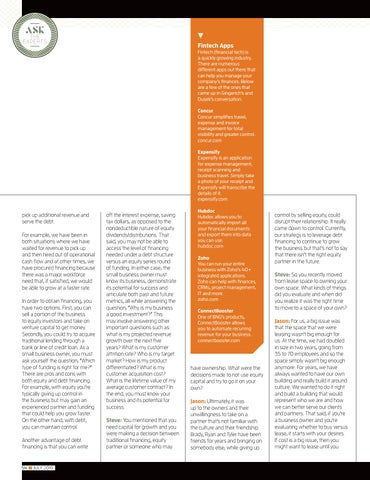Fintech Apps
Fintech (financial tech) is a quickly growing industry. There are numerous different apps out there that can help you manage your company’s finances. Below are a few of the ones that came up in Gingerich’s and Dusek’s conversation. Concur Concur simplifies travel, expense and invoice management for total visibility and greater control. concur.com Expensify Expensify is an application for expense management, receipt scanning and business travel. Simply take a photo of your receipt and Expensify will transcribe the details of it. expensify.com
pick up additional revenue and serve the debt. For example, we have been in both situations where we have waited for revenue to pick up and then hired out of operational cash flow and at other times, we have procured financing because there was a major workforce need that, if satisfied, we would be able to grow at a faster rate. In order to obtain financing, you have two options. First, you can sell a portion of the business to equity investors and take on venture capital to get money. Secondly, you could try to acquire traditional lending through a bank or line of credit loan. As a small business owner, you must ask yourself the question, “Which type of funding is right for me?” There are pros and cons with both equity and debt financing. For example, with equity you’re typically giving up control in the business but may gain an experienced partner and funding that could help you grow faster. On the other hand, with debt, you can maintain control. Another advantage of debt financing is that you can write
54
JULY 2019
off the interest expense, saving tax dollars, as opposed to the nondeductible nature of equity dividends/distributions. That said, you may not be able to access the level of financing needed under a debt structure versus an equity series round of funding. In either case, the small business owner must know its business, demonstrate its potential for success and articulate both past and future metrics, all while answering the question, “Why is my business a good investment?” This may involve answering other important questions such as: what is my projected revenue growth over the next five years? What is my customer attrition rate? Who is my target market? How is my product differentiated? What is my customer acquisition cost? What is the lifetime value of my average customer contract? In the end, you must know your business and its potential for success. Steve: You mentioned that you need capital for growth and you were making a decision between traditional financing, equity partner or someone who may
Hubdoc Hubdoc allows you to automatically import all your financial documents and export them into data you can use. hubdoc.com Zoho You can run your entire business with Zoho’s 40+ integrated applications. Zoho can help with finances, CRMs, project management, IT and more. zoho.com ConnectBooster One of BNG’s products, ConnectBooster allows you to automate recurring revenue for your business. connectbooster.com
have ownership. What were the decisions made to not use equity capital and try to go it on your own? Jason: Ultimately, it was up to the owners and their unwillingness to take on a partner that’s not familiar with the culture and their friendship. Brady, Ryan and Tyler have been friends for years and bringing on somebody else, while giving up
control by selling equity, could disrupt their relationship. It really came down to control. Currently, our strategy is to leverage debt financing to continue to grow the business but that’s not to say that there isn’t the right equity partner in the future. Steve: So you recently moved from lease space to owning your own space. What kinds of things did you evaluate and when did you realize it was the right time to move to a space of your own? Jason: For us, a big issue was that the space that we were leasing wasn’t big enough for us. At the time, we had doubled in size in two years, going from 35 to 70 employees and so the space simply wasn’t big enough anymore. For years, we have always wanted to have our own building and really build it around culture. We wanted to do it right and build a building that would represent who we are and how we can better serve our clients and partners. That said, if you’re a business owner and you’re evaluating whether to buy versus lease, it starts with your desires. If cost is a big issue, then you might want to lease until you
